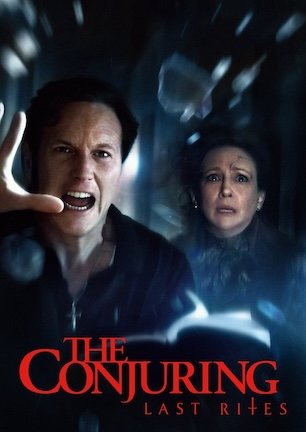Studio: Paramount/Platinum Dunes
Director: Natalie Erika James
Writer: Natalie Erika James, Christian White, Skylar James
Producer: John Krasinski, Allyson Seeger, Michael Bay, Andrew Form, Brad Fuller
Stars: Julia Garner, Dianne Wiest, Jim Sturgess, Kevin McNally, Marli Siu, Andrew Buchan, Rosy McEwen, Kobna Holdbrook-Smith
Review Score:
Summary:
In New York City in 1965, an aspiring dancer gets drawn into a Satanic conspiracy after moving into an infamous apartment building.
Review:
Roman Polanski's "Rosemary's Baby" (review here) spawned a peculiar sequel in 1976 that made some curious creative choices. Broadcast as an ABC-TV movie, "Look What's Happened to Rosemary's Baby" (review here) featured Ruth Gordon revisiting her Academy Award-winning role of Minnie Castevet, Tina Louise from "Gilligan's Island" as a devil-obsessed trailer park hooker, and Stephen McHattie playing an adult antichrist with a penchant for disco dancing in mime makeup. Although it doesn't possess the production quality required to be considered a "lost classic," the forgotten film still stands out as a strange sprinkling of nostalgia from an era when broadcast television wasn't afraid to be bizarre. If you can't be "good," at least be "weird," and "Look What's Happened to Rosemary's Baby" definitely leans toward the latter.
"Rosemary's Baby" prequel "Apartment 7A," on the other hand, is neither particularly good nor weird by traditional definitions. Overcorrecting in the opposite direction by being plainly pedestrian, "Apartment 7A" plays more like a remake than a prequel since aspiring dancer Terry Gionoffrio's arc follows Rosemary's story virtually beat for beat, leaving no room for surprises or suspense for anyone already familiar with the original motion picture.
If the 1968 film is vivid in your memory, you may remember Terry Gionoffrio from "Rosemary's Baby." When Guy and Rosemary Woodhouse first move into the notorious Bramford building, Rosemary meets Terry in the laundry room. Introducing herself as a guest of Minnie and Roman Castevet, Terry shows Rosemary a pungent necklace the couple gave her as a gift. Rosemary sees Terry again three movie minutes later under very different circumstances. If you recall those circumstances, that scene becomes a spoiler for how "Apartment 7A" ends.
Back to the beginning, Terry is struggling to make her way in New York City in 1965. Later on, Terry has a contemplative moment where she watches a girl get off a bus with suitcase in hand, staring wide-eyed at the bright lights of a Broadway marquee. A naive farmgirl from Nebraska, Terry likely wore the same elated expression once, although "Apartment 7A" might have been more subtle about the cliched metaphor if either girl had been depicted bouncing out the back of a turnip truck instead.
Terry hits hard times after injuring her leg during a performance. She starts popping painkillers, flops audition after audition, and struggles to pay her rent. A role in famed director Alan Marchand's new musical could be a big break. Terry just needs Marchand to pay attention to her.
Hoping to plead her case in person, Terry follows Marchand back to The Bramford. Terry never makes it to Marchand, because she becomes mysteriously dizzy almost as soon as she enters the lobby. Terry rushes outside, right into the arms of Minnie and Roman Castevet, who take the girl up to their apartment to recover, and ultimately offer her a place to stay until she can get herself together and her career back on track.
The Castevets quickly use their connections to get Terry that meeting with Marchand, except their meeting takes the form of drugged drinks in his apartment. Terry's groggy head fades in and out of a fantasy where she does a dance routine in a dark theater, though the dream morphs into a nightmare when it ends with a bejeweled beast mounting her helpless body. When she later turns out to be pregnant, Terry assumes Marchand must be the father, but the truth is more terrifying than that.
Establishing itself as a quiet thriller with moody drama first and foremost, "Apartment 7A" tries to slide in subtext about the misogynistic manipulation of casting couches and abused power dynamics, but oddly never fully commits to the commentary. Terry expresses unease over what happened in Marchand's apartment, yet she doesn't conclusively confirm if she considers Marchand a rapist, or partly blames herself for possibly drunken sex she doesn't remember. Terry runs a gauntlet of humiliating hurdles that hammer home the notion she's better off keeping her mouth shut no matter who demeans her, but other than merely presenting inappropriate behavior as bad, a screenplay more concerned about conventions like a nun's serendipitously silly exposition doesn't offer original food for thought on the topic.
Instead of taking on a post-MeToo tone, "Apartment 7A" might have delivered more striking, and timely, material by approaching Terry's situation from a post-Roe perspective. Terry not only considers abortion, her friend accompanies her to an alleyway clinic for a procedure that's prevented by supernatural forces. For a 2024 film that takes place in 1965 to not draw sharper parallels between the two contrasted social climates feels cowardly, and does the film a disservice by reducing it to a standard scary movie afraid to deeply explore issues of bodily autonomy and culpability.
A couple of buoys keep "Apartment 7A" from becoming completely submerged in redundant waters. A few CGI enhancements on background scenery notwithstanding, sets, costumes, and props accurately recreate 1960s New York along with recognizable "Rosemary's Baby" locations. Arguably underused, Dianne Wiest eats up the Minnie Castevet role by doing a devilishly delightful impression of Ruth Gordon and never wavering from the imitation. Julia Garner rivals Elisabeth Moss as an actor who can emit strength, sorrow, subservience, or sudden emotional shifts with looks alone. "Apartment 7A's" script is below Garner's abilities, but her captivating presence sells Terry's story even though it's only echoing the same tale told six decades earlier.
As a standalone thriller, Garner, Wiest, and appealing production design make the movie worth 100 minutes of time. As a prequel, "Apartment 7A" serves no appreciable purpose, since the film doesn't add nuance to "Rosemary's Baby" or reveal anything new about carryover characters like Dr. Sapirstein or the Castevets. The only difference between how the two films operate is that we know how this one will turn out because we've seen these exact same events before. Basically, Terry Gionoffrio's ordeal simply seems like a trial run for what Rosemary Woodhouse experiences in a scarier, sleeker, superior movie.
Review Score: 55






I don’t know whether to emphasize “this” or “the,” but this is the humorous holiday horror movie you definitely want to enjoy at Christmastime.